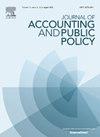How does mandated sustainability disclosure about conflict minerals affect supply chain finance?
IF 2.2
3区 管理学
Q1 BUSINESS, FINANCE
引用次数: 0
Abstract
We use the 2010 Dodd-Frank Act, which mandated that firms disclose the use of conflict minerals in their supply chain, to investigate whether and how conflict minerals disclosure (CMD) impacts the trade credit that a firm receives from its suppliers. Using a large sample of U.S. firms from 2014 to 2016, we find that firms that provide more-specific, rather than less-specific, CMD receive 6.45% more trade credit. This finding is consistent with more-specific CMD enhancing firms’ supply chain visibility, as well as reducing suppliers’ adverse selection concerns about lending to socially irresponsible firms. Consistent with the enhanced supply chain visibility channel, we find that the positive association is more pronounced for firms with more product market competition or financial constraints. In keeping with the reduced adverse selection channel, we find a more pronounced positive association for firms with weaker monitoring by non-supplier stakeholders. Finally, we find that firms with more-specific CMD provide less downstream trade credit, suggesting that the reputational benefit gained from disclosing socially responsible sourcing enables these firms to rely less on trade credit to attract or capture customers. Overall, our paper offers novel insight into how mandated sustainability disclosures, specifically CMD, affect supply chain finance.
强制性的冲突矿产可持续性披露如何影响供应链金融?
2010年《多德-弗兰克法案》(Dodd-Frank Act)要求企业披露其供应链中冲突矿产的使用情况,我们使用该法案来调查冲突矿产披露(CMD)是否以及如何影响企业从供应商那里获得的贸易信用。使用2014年至2016年的美国公司大样本,我们发现提供更具体而非更不具体CMD的公司获得的贸易信贷增加了6.45%。这一发现与更具体的CMD相一致,该CMD增强了企业的供应链可见性,并减少了供应商对向社会不负责任的企业提供贷款的逆向选择担忧。与增强的供应链可见性渠道一致,我们发现,对于产品市场竞争更激烈或财务约束更强的企业,这种正相关关系更为明显。为了与减少的逆向选择渠道保持一致,我们发现非供应商利益相关者监督较弱的公司存在更明显的正相关关系。最后,我们发现拥有更具体的CMD的公司提供更少的下游贸易信贷,这表明披露社会责任采购所获得的声誉利益使这些公司减少了对贸易信贷的依赖来吸引或捕获客户。总体而言,我们的论文提供了关于强制性可持续性披露(特别是CMD)如何影响供应链金融的新见解。
本文章由计算机程序翻译,如有差异,请以英文原文为准。
求助全文
约1分钟内获得全文
求助全文
来源期刊

Journal of Accounting and Public Policy
Multiple-
CiteScore
4.80
自引率
2.80%
发文量
75
期刊介绍:
The Journal of Accounting and Public Policy publishes research papers focusing on the intersection between accounting and public policy. Preference is given to papers illuminating through theoretical or empirical analysis, the effects of accounting on public policy and vice-versa. Subjects treated in this journal include the interface of accounting with economics, political science, sociology, or law. The Journal includes a section entitled Accounting Letters. This section publishes short research articles that should not exceed approximately 3,000 words. The objective of this section is to facilitate the rapid dissemination of important accounting research. Accordingly, articles submitted to this section will be reviewed within fours weeks of receipt, revisions will be limited to one, and publication will occur within four months of acceptance.
 求助内容:
求助内容: 应助结果提醒方式:
应助结果提醒方式:


